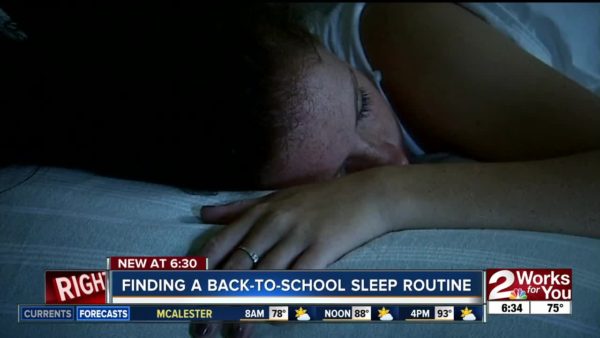
![items.[0].videoTitle](http://www.grandmashealthykidsclub.com/wp-content/uploads/2019/08/local-news-how-to-get-your-child-back-into-a-sleep-routine-travis-guillory-724-kjrh-com.jpg)
Travis Guillory sits down with a pediatric sleep specialist to find out ways to get your child to fall asleep and get back into a sleep routine.
TULSA — After a summer of sleeping in, getting kids back into a sleep routine for school can be difficult.
Tara Hess with Tulsa Pediatric Sleep Consulting said, “During the summer, a lot of us get more relaxed with our schedules. A lot of kids are going to bed too late right now, including my own children.”
Hess says it’s best to start making your child get some shut eye early on in the days and even weeks leading up to the start of school, adding, “We don’t want to wait until the night before school starts and then suddenly just try to put our kids to bed earlier and wake them up earlier. That will not go well for anyone.”
She suggests moving bedtime up 10 to 15 minutes earlier and earlier every night until you get to your child’s desired sleep time, which is based on what time they need to wake up.
But once the monsters under the bed are gone, the real monster is getting your kids to actually fall asleep. The sleep consultant offered some advice.
Hess explained, “Dinnertime is actually an important detail in how easily we fall asleep. The digestive process can interfere with falling asleep, so I usually recommend that dinner is two hours before bedtime.”
She said caffeine intake is also important to monitor, especially the hidden kind, like in chocolate. “Caffeine can stay in a child’s bloodstream for a lot longer than it stays in an adult’s bloodstream,” Hess explained. “It stays in a child’s bloodstream for up to 8 to 12 hours.” So, that chocolate chip cookie after school may hinder your child from catching those Z’s around that 9 p.m. bedtime.
But the biggest offender for kids not falling asleep quickly, though, is bright screens.
The sleep specialist said, “The closer the screen is, the worse it is. If you’re watching a tv far away on the wall, it actually won’t affect your melatonin levels as much as if you’re watching your iPad or your phone and it’s right up next to you.”
The American Academy of Pediatrics recommends no more than two hours of screen time per day. Hess says a good way to do that is getting electronics out of the bedroom and no screen time in the last one to two hours before bedtime.
She also suggests no rambunctious activity or rough-housing before bedtime.
When it comes to medicated sleep aids, Hess does not recommend giving your child melatonin without consulting with your pediatrician.
And consistency in a sleep routine is important with the same bed time and same wake up time.
Stay in touch with us anytime, anywhere.
Download our free app for Apple and Android and Kindle devices.
Sign up for newsletters emailed to your inbox. Select from these options: Breaking News, Severe Weather, School Closings, Daily Headlines and Daily Forecasts.
Copyright 2019 Scripps Media, Inc. All rights reserved. This material may not be published, broadcast, rewritten, or redistributed.